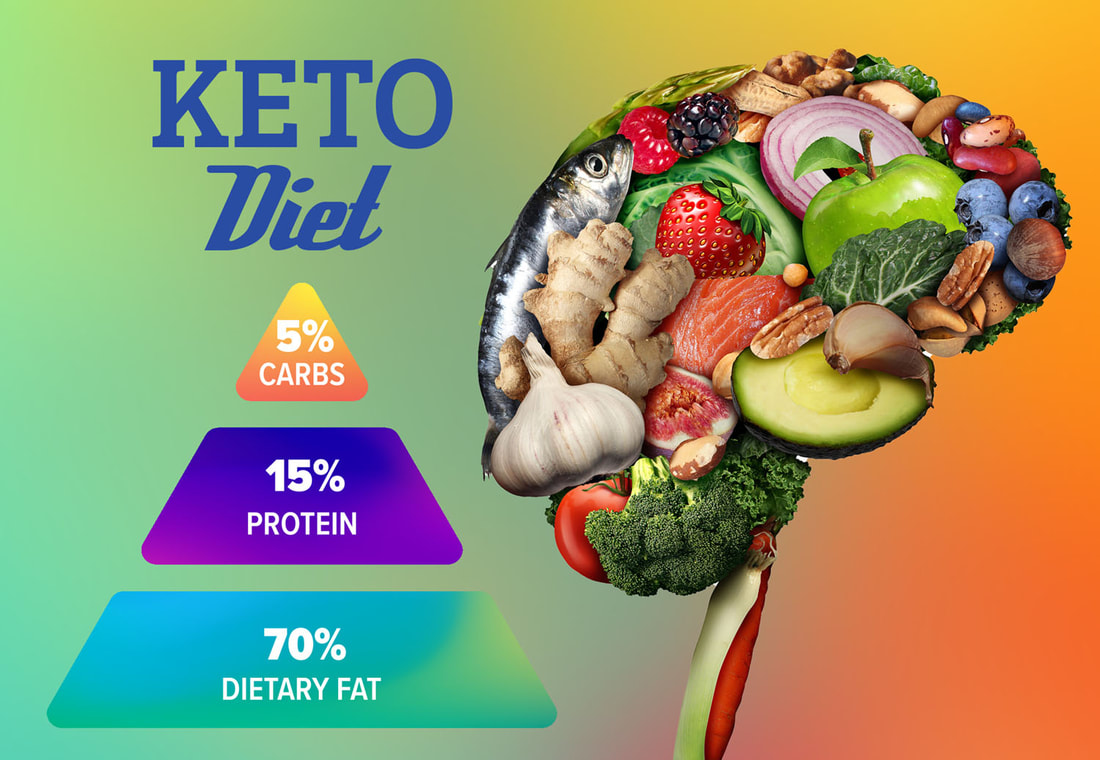Dr. Dale Bredesen’s program utilizes a ketogenic type of diet that based on the way we use certain foods and nutrients may be beneficial to our brain as well as our overall health. Some of the science. Alzheimer’s disease (AD) is a progressive neurodegenerative disorder marked by decline in several cognitive processes and resulting memory loss and confusion that impacts daily life functions. It is the most common form of dementia and according to the Alzheimer’s Association, it is now the seventh leading cause of death in the U.S. AD is associated with the neuropathological hallmarks of amyloid β-peptide plaques and neurofibrillary tangles; amyloid plaques are clusters that form in the spaces between the nerve cells, whereas the neurofibrillary tangles are a knot of the brain cells. Cerebral glucose uptake and metabolism deteriorate in AD and it is believed this hypometabolism precedes the onset of clinical signs in the disease. As such, this early decline in brain glucose metabolism in AD has become a potential target for therapeutic intervention. This has led to investigations assessing the supplementation of the normal glucose supply with ketone bodies that are produced during glucose deprivation and can be metabolized by the brain when glucose utilization is impaired.2, 3 A Ketogenic Diet and APOE genes. The ketogenic diet is a high-fat, adequate-protein, low-carbohydrate diet that in medicine is used traditionally to treat hard-to-control epilepsy in children.4 Ketogenic diets essentially force the body to burn fats rather than carbohydrates as its source of energy. Additional benefits include: 1. Triglycerides tend to drop drastically. 2. Increased levels of “good” HDL cholesterol. 3. Reduced blood sugar and insulin levels. 4. May lower blood pressure. 5. Effective against metabolic syndrome. 6. A greater proportion of fat loss that comes from the abdominal cavity. 7. Improved “bad” LDL cholesterol levels. 8. Therapeutic for several brain disorders (Alzheimer's and Parkinson's disease). Now, with all of these benefits, the scientific literature has investigated if indeed this type of diet is beneficial for all people. Well, the answer may ultimately come down to your particular genes or, more specifically, your APOE genotype. The APOE gene provides instructions for making a protein called apolipoprotein E(APOE). This protein combines with fats (lipids) in the body to form molecules called lipoproteins. Lipoproteins are responsible for packaging cholesterol and other fats and carrying them through the bloodstream.5 There are actually three different types of APOE genes: APOE2 – Best suited to a high fat or low fat diet (saturated fats are okay). APOE3 – Suitable for either. APOE4 – Best Suited For A high monounsaturated fat/low carbohydrate diet (avoid saturated fats) The APO E3/E3 genotype is considered normal, with about 60% of the general population having this genotype and what we define as “normal” cholesterol metabolism. On the other hand, the presence of an E2 or E4 gene in the other 40% is associated with some form of altered or “abnormal” cholesterol metabolism; E2 is associated with lower levels of cholesterol while E4 is associated with higher levels. Research studies have shown that APOE4 carriers are most effected by high cholesterol, and benefit more from a low saturated fat diet, instead using monounsaturated fats, low carb diet, whereas APOE 2 carriers suit a high fat low carb diet, regardless of the saturated fats. So what should you do? Ask your doctor to order the APOE genotype blood test and see if you are in fact a carrier of the APOE4 gene. If you are a carrier of the APOE4 gene, I recommend decreasing your consumption of saturated fats and focus more on monounsaturated fats. What are “good” vs. “bad” fats? It can be somewhat confusing to distinguish between good and bad fats. So, for some basics:
Making good fats choices! A trip to any grocery store is fraught with choices – and it’s not easy to make the right ones so here are a few ideas to help guide your shopping trip:
Avocado: contains oleic acid, which may help reduce inflammation. Olives and olive oil: promotes both brain and heart health. Fatty fish: mackerel, salmon, herring, anchovy, sardine, trout. If possible, try to purchases wild-caught fish. Eggs and lean red meat, especially organic, grass-fed or grass-finished products.
Butter, cheese, cream, and ice cream. Some fats and oils such as coconut, palm, and palm kernel oil Important note regarding oils…certain oils such as soybean, peanut and corn oil are liquid at room temperature, but are often industrially processed, which can make them highly inflammatory. Ideally, choose minimally processed or pressed oils like olive and put your label-reading skills to work to determine where and how any food item was produced. Remember that using a healthy oil in a salad won’t make up for a diet full of processed foods or excess sugar-laden snacks. Always consult your physician or a nutritional counselor to make sure that any eating plan you follow is right for your particular health needs and considers any condition or other concerns – drastic changes aren’t necessarily healthy ones. And remember that any diet is just one part of a lifestyle approach that includes other integrative medicine tenets designed to encourage optimum brain and general wellness! In hope and healing, Dr. Suzanne Gazda References: 1 Apollo Health https://www.apollohealthco.com/bredesen-protocol/ 2 Klaus W. Lange, Katharina M. Lange, Ewelina Makulska-Gertruda, Yukiko Nakamura, Andreas Reissmann, Shigehiko Kanaya, Joachim Hauser. Ketogenic diets and Alzheimer’s disease. Food Science and Human Wellness, Volume 6, Issue 1, 2017, Pages 1-9, ISSN 2213-4530, https://doi.org/10.1016/j.fshw.2016.10.003 https://www.sciencedirect.com/science/article/pii/S2213453016301355#bib0400 3 Gasior, M., Rogawski, M. A., & Hartman, A. L. (2006). Neuroprotective and disease-modifying effects of the ketogenic diet. Behavioural pharmacology, 17(5-6), 431–439. https://doi.org/10.1097/00008877-200609000-00009 https://www.ncbi.nlm.nih.gov/pmc/articles/PMC2367001 4 Ketogenic diet https://en.wikipedia.org/wiki/Ketogenic_diet 5 Gazda, S.K. (2020) The APOE gene and its role in cognitive decline. https://www.suzannegazdamd.com/scientifically-speaking1/the-apoe-gene-and-its-role-in-cognitive-decline 6 Michigan Medicine, University of Michigan https://www.uofmhealth.org/health-library/aa160619 Additional scientific reading: Wood RJ, Volek JS, Liu Y, Shachter NS, Contois JH, Fernandez ML. Carbohydrate restriction alters lipoprotein metabolism by modifying VLDL, LDL, and HDL subfraction distribution and size in overweight men. J Nutr. 2006;136(2):384-389. doi:10.1093/jn/136.2.384 https://pubmed.ncbi.nlm.nih.gov/16424116/ Wood RJ, Volek JS, Liu Y, Shachter NS, Contois JH, Fernandez ML. Carbohydrate restriction alters lipoprotein metabolism by modifying VLDL, LDL, and HDL subfraction distribution and size in overweight men. J Nutr. 2006;136(2):384-389. doi:10.1093/jn/136.2.384 https://pubmed.ncbi.nlm.nih.gov/16424116 Volek, J.S., Feinman, R.D. Carbohydrate restriction improves the features of Metabolic Syndrome. Metabolic Syndrome may be defined by the response to carbohydrate restriction. Nutr Metab (Lond) 2, 31 (2005). https://doi.org/10.1186/1743-7075-2-31 https://nutritionandmetabolism.biomedcentral.com/articles/10.1186/1743-7075-2-31 Feinman RD, Makowske M. Metabolic syndrome and low-carbohydrate ketogenic diets in the medical school biochemistry curriculum. Metab Syndr Relat Disord. 2003;1(3):189-197. doi:10.1089/154041903322716660 https://pubmed.ncbi.nlm.nih.gov/18370662 Gardner CD, Kiazand A, Alhassan S, et al. Comparison of the Atkins, Zone, Ornish, and LEARN diets for change in weight and related risk factors among overweight premenopausal women: the A TO Z Weight Loss Study: a randomized trial [published correction appears in JAMA. 2007 Jul 11;298(2):178]. JAMA. 2007;297(9):969-977. doi:10.1001/jama.297.9.969 https://pubmed.ncbi.nlm.nih.gov/17341711 Yancy, W.S., Foy, M., Chalecki, A.M. et al. A low-carbohydrate, ketogenic diet to treat type 2 diabetes. Nutr Metab (Lond) 2, 34 (2005). https://doi.org/10.1186/1743-7075-2-34 https://nutritionandmetabolism.biomedcentral.com/articles/10.1186/1743-7075-2-34 Noakes M, Foster PR, Keogh JB, James AP, Mamo JC, Clifton PM. Comparison of isocaloric very low carbohydrate/high saturated fat and high carbohydrate/low saturated fat diets on body composition and cardiovascular risk. Nutr Metab (Lond). 2006;3:7. Published 2006 Jan 11. doi:10.1186/1743-7075-3-7 https://pubmed.ncbi.nlm.nih.gov/16403234 Berglund L, Oliver EH, Fontanez N, et al. HDL-subpopulation patterns in response to reductions in dietary total and saturated fat intakes in healthy subjects. Am J Clin Nutr. 1999;70(6):992-1000. doi:10.1093/ajcn/70.6.992 https://pubmed.ncbi.nlm.nih.gov/10584043 Mensink RP, Katan MB. Effect of dietary fatty acids on serum lipids and lipoproteins. A meta-analysis of 27 trials. Arterioscler Thromb. 1992;12(8):911-919. doi:10.1161/01.atv.12.8.911 https://pubmed.ncbi.nlm.nih.gov/1386252 Mensink RP, Zock PL, Kester AD, Katan MB. Effects of dietary fatty acids and carbohydrates on the ratio of serum total to HDL cholesterol and on serum lipids and apolipoproteins: a meta-analysis of 60 controlled trials. Am J Clin Nutr. 2003;77(5):1146-1155. doi:10.1093/ajcn/77.5.1146. https://pubmed.ncbi.nlm.nih.gov/12716665 Volek J, Sharman M, Gómez A, et al. Comparison of energy-restricted very low-carbohydrate and low-fat diets on weight loss and body composition in overweight men and women. Nutr Metab (Lond). 2004;1(1):13. Published 2004 Nov 8. doi:10.1186/1743-7075-1-13 https://pubmed.ncbi.nlm.nih.gov/15533250 Campos H, D'Agostino M, Ordovás JM. Gene-diet interactions and plasma lipoproteins: role of apolipoprotein E and habitual saturated fat intake. Genet Epidemiol. 2001;20(1):117-128. doi:10.1002/1098-2272(200101)20:1<117::AID-GEPI10>3.0.CO;2-C https://pubmed.ncbi.nlm.nih.gov/11119301
0 Comments
Your comment will be posted after it is approved.
Leave a Reply. |
AuthorDr. Suzanne Gazda, Integrative Neurology Archives
February 2024
Categories |


 RSS Feed
RSS Feed